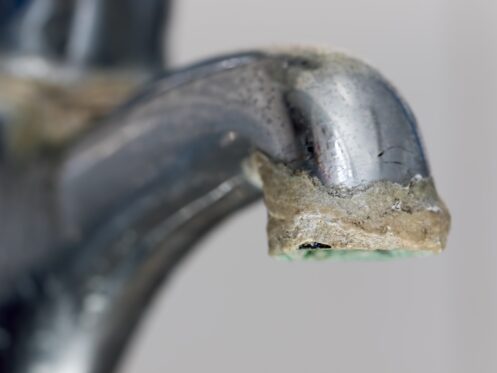Water hardness is the amount of dissolved calcium and magnesium in water. The U.S. Geological Survey classifies hard water based on the milligrams per liter (mg/L) of calcium carbonate in the water. Soft water has 0 to 60 mg/L. Beyond 60 mg/L, your water can be moderately hard, hard, or very hard. A household can have hard water whether it has a well or receives water from a municipal supply. Hard water can have a devastating effect on your plumbing over time and result in many additional maintenance and repair costs. Specialized water treatment systems can help, but first, we’ll get into the details of what hard water is and why it matters.
Hard Water Scale
Hard water scale, also called limescale and simply scale, is a chalky substance that can build up almost anywhere. It can accumulate on basement walls and inside pipes, fixtures, and appliances. Scale is the deposits left behind when calcium carbonate precipitates out of the water. Precipitation occurs when water remains still for extended periods or its temperature rises. Think of calcium carbonate as dissolved sugar in water. If you heat the sugar water, some sugar will crystallize and settle at the bottom of the container. Crystalline structures from hard water are a major concern for your home’s plumbing system.
Water Pressure
Scale builds up inside pipes and binds to the walls well enough that the standard water flow can’t dislodge it. These layers are microscopically thin, but with each new layer, the scale accumulation becomes more substantial. The standard plumbing pipe inside a home has a diameter between 3/4 inch and 1 inch. As the scale builds up, that diameter shrinks, and less water can flow through the obstructed pipes. That leads to significantly lower water pressure over time, so it takes longer to fill containers, sinks, and bathtubs. Substantially reduced water flow also stresses pipes, fixtures, and appliances that rely on water pressure.
Pipe Corrosion
Corrosion is another major concern and can happen to metal pipes, valves, and other connections. The process accelerates pipe and valve deterioration and forces homeowners to replace components prematurely. Scale promotes corrosion in several ways. The rough outer surface provides traction for chemicals, such as chlorides, and microorganisms, such as bacteria. Scale can trap chemicals and microorganisms between the buildup and the pipe. It can compromise inner pipe coatings and other corrosion inhibitors. Scale can even serve as an anode and result in an anode-cathode configuration. When that occurs, electrons bounce between the pipe walls and scale and cause localized corrosion. That can result in pinholes that leak water but can go undetected for a long time.
Drainage Issues
Your plumbing can accumulate scale wherever water flows. That includes kitchen and bathroom sink drains, shower and bathtub drains, toilets, and floor drains in garages and basements. Often, full blockages from scale are less of a concern in these scenarios. Drains in homes are usually wider than an inch and can range up to 4 inches for the main line. Still, scale accumulates on the pipe walls and can trap food, hair, and foreign objects.
Scale on pipe walls also reacts chemically with detergents in the water. That chemical reaction can promote a sludge that attaches to the scale and worsens the problem. It can make your home more prone to local clogs, such as under sinks and in toilets. The sludge can also promote blockages deeper in the system, such as the main sewer line. Hydro jetting can clear the scale and sludge from a sewer line. For smaller-diameter drains, jetting may not be practical. Snaking drains is an option, but the buildup that remains on the pipe walls may make you susceptible to future clogs.
Tank and Tankless Water Heaters
Hard water wreaks havoc on all water heaters, as it accumulates on and in various components throughout the system. According to the U.S. Department of Energy (DOE), water heaters are typically the second largest energy expense in an American home. Scale makes a water heater less efficient because it increases pressure, causes inconsistent water temperatures, and acts like an insulator. Those factors heighten electricity and fuel consumption and your operating costs.
Scale can promote corrosion in a water heater just as in your pipes. That will eventually undermine the tank and cause it to leak. Corrosion can also lead to the premature failure of valves, thermostats, heating elements, and many other parts. This is why regular water heater maintenance is so important. Tank water heaters require periodic tank flushing and anode rod replacement. Tankless water heaters require periodic descaling and filter replacement.
If you have moderately hard water, consider adding an anti-scale device to your water heater. If your water is hard or very hard, consider a whole-home water softener instead. These upgrades can pay for themselves by lowering operating costs and extending the life of the equipment.
Hydronic Heating Systems
Hydronic heating systems, such as hot water and steam boilers, are quite similar to water heaters. Scale can undermine tanks, radiators, and radiant panel tubing. Routine boiler maintenance is a must, and you may want to consider the upgrades mentioned earlier. Unattended hard water can shorten boiler and water heater lifespans by as much as 50%.
Kitchen Fixtures
Scale can significantly reduce the lifespan of kitchen fixtures, including faucets, sprayers, and pot fillers. It can make them more difficult to clean. Garbage disposal systems in homes with hard water will require more maintenance. The scale can also undermine aerators, O-rings, washers, faucet seats, and other components that you’ll have to replace more often.
Bathroom Fixtures
Just as in kitchens, scale undermines faucets and drains in bathrooms. Homeowners with hard water may have to replace faucets, showerheads, and toilets twice as often. Scale can accumulate in the jets of a toilet and lead to inefficient flushing. It can also cause the parts in the tank to deteriorate more quickly.
Hard water can also lead to less enjoyable shower experiences. The minerals in the water coat your skin and can make you feel less clean than you otherwise would. It can clog your pores and lead to or worsen common skin conditions, such as eczema. Hard water makes for bad hair days and can cause hair to be more brittle and break more easily.
Dishwashers and Washing Machines
According to Water Quality Association research, washing machines and dishwashers fail four years sooner, on average, with hard water. Scale also increases electricity consumption by as much as 50%. The other issue with hard water is its effect on laundry and dish detergents. Soap doesn’t lather as well and is, therefore, less effective. Compensating by using more detergent can lead to much higher laundry and dish cleaning costs over time.
Hard Water Solutions in Colorado Springs
Alphalete Plumbing Drain Heating & Air is a locally owned family business in Colorado Springs, CO. As a leading residential plumbing contractor in the region, we’ve helped many area households protect themselves from hard water. Our licensed plumbers perform camera inspections, standard drain cleaning, and hydro jetting. We also install and service point-of-use and point-of-entry water softening systems.
To learn more about our plumbing products and services, call Alphalete Plumbing Drain Heating & Air today, or contact us online.


